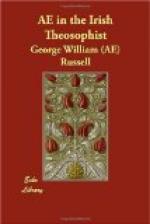Then Liban came softly up to her, saying:
“Oh, Fand, my soul is sad this night. The dark powers are gathering their strength to assail us, and we shall need to be pure and strong. Yet you have said that you feel no longer the Presence with you; that Mannanan, the Self of the Sun, shines not in your heart!”
Fan placed her hand upon her sister’s flaxen head, saying with a voice mingled joy and pathos:
“Peace, child; you, of us all, have least to fear, for though I, alas! am forsaken, yet He who is your Father and Yourself is even now here with you.”
Liban fell on her knees, with her hands clasped and her eyes uplifted in a rapture of adoration, for above her floated one whom she well knew. Yet unheeding her and stern of glance, with his right arm outstretched, from which leaped long tongues of flame, swordlike, into space, Labraid towered above gazing upon foes unseen by them. Slowly the arm fell and the stern look departed from the face. Ancient with the youth of the Gods, it was such a face and form the toilers in the shadowy world, mindful of their starry dynasties, sought to carve in images of upright and immovable calm amid the sphinxes of the Nile or the sculptured Gods of Chaldaea. So upright and immovable in such sculptured repose appeared Labraid, his body like a bright ruby flame, sunlit from its golden heart. Beneath his brows his eyes looked full of secrecy. The air pulsing and heaving about him drove Laeg backward from the centre of the room. He appeared but a child before this potent spirit. Liban broke out into a wild chant of welcome:
“Oh see now how burning,
How
radiant in might,
From battle returning
The
Dragon of Light!
Where wert thou, unsleeping
Exile
from the throne,
In watch o’er the weeping,
The
sad and the lone.
The sun-fires of Eri




